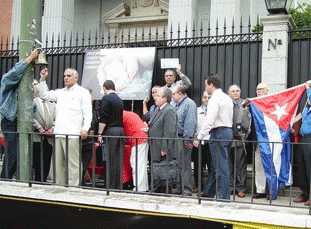The outstanding e-book State
Secret, by Bill Simpich, concurs with the scholarly destitute
paperback edition of Castro's Secrets (Palgrave Macmillan, 2013), by Dr.
Brian Latell, in deeming CIA agent Rolando
Cubela (AMLASH-1) as a double agent ultimately loyal to Castro.
The CIA operation AMLASH
(1961-65) began by simply recruiting Cubela, but turned into a plot to kill
Castro. It would be twisted in a manner that Senator Robert Morgan (D/N.C.) summed
up as follows: "JFK was assassinated by Fidel Castro or someone under his
influence in retaliation for our efforts to assassinate him [and] this fellow [Cubela]
was nothing but a double agent."
The retaliation hypothesis is neither logically nor
circumstantially justified. Castro knew that risking everything to kill a
sitting U.S. President would result in gaining nothing else than another U.S.
President. And even declassified files in Eastern Europe
show that he considered Kennedy the best option among the possible U.S.
presidents emerging from the 1964 elections.
Moreover, in 1984 Castro knew about an extreme right-wing
conspiracy to kill the worst U.S.
president for him, Ronald Reagan. The Castroit General Directorate of
Intelligence (DGI) furnished the intel to the U.S. Security Chief at United
Nations, Robert Muller, and the FBI proceeded to dismantle the plot in North
Carolina.
The plain fact is that Castro dodged the efforts to assassinate him by
penetrating the Cuban exile and the CIA with
DGI agents who told him right back what his enemies were up to. And he
cautiously made no distinction. Long before the AMLASH plot, Castro assumed
that the CIA stood behind any anti-Castro deed.
That's why Simpich is wrong by embracing Dr. Latell and asserting that
only when the CIA cut all ties with Cubela, "only then did Castro arrest [him],
have him tried on disloyalty charges unrelated to his CIA
activities, and give him a jail sentence that was combined with big freedoms."
The Cubela Criminal Case
On March
1, 1966, the Cuban official newspaper Granma
broke the news that Rolando Cubela and Ramon Guin had been arrested "due to
counterrevolutionary activities in connection with the CIA."
The coverage followed with a communiqué of the Interior Ministry: "The traitors
Cubela and Guin were plotting an attempt against Fidel" (March 5), the
announcement of their confession (March 8), the trial (March 9 and 10), and the
sentence (March 11).
On March 9, Castro made public his letter asking the
prosecutor Jorge "Papito" Serguera for sparing the life of the defendants
because "the revolution is strong and there is nothing to fear." The same day Castro
burned DGI officer Juan Felaifel as "the Cuban agent who infiltrated the CIA"
in 1963 and came back "three years later with dramatic revelations."
Felaifel had "disappeared" off the Cuban coast during an
infiltration mission on February 24,
1966. He reappeared as prosecutor witness at Cubela's trial and
testified he was told of a plot against Castro "by CIA
agent Anis, my brother, who at the time was also the intelligence chief of the
counterrevolutionary organization directed by [Manuel] Artime. He, with Artime
and the Galician Sainz, made the silencer for the 7.62 mm FAL rifle, identical
to the one Cubela had here in Cuba."
The 1967 CIA Inspector General's
Report explained that the Agency "contrived to put B-1 [Artime] and AMLASH
together in such a way that neither of them knew that the contact had been
engineered by CIA. The thought was that B-1
needed a man inside and AMLASH wanted a silenced weapon, which CIA
was unwilling to furnish to him directly. By putting the two together, B-1
might get its man inside Cuba
and AMLASH might get his silenced weapon from B-1."
For Castro (and for many others), that's a bunch of
malarkey. Artime had been the political chief of the CIA
Brigade 2506 at Bay of Pigs and his Revolutionary
Recovery Movement (Spanish acronym MRR)
continued the war against Castro through CIA-sponsored
"autonomous operations" from bases in Central America.
For Castro (and for many others), the CIA
stood behind any Airtime's deed.
The Cubela imprisonment
Before a panel of the House Select Committee on
Assassinations (HSCA) that interviewed him at the Riviera Hotel in Havana
on August 28, 1978, Cubela
stated "he did not give the Cuban government any information that would have
led it to believe that the CIA was involved
in a plot on Castro's life in 1963."
The HSCA took into account the possible influence of his
confinement on his testimony, but since August 2, 1978, before "The Youth
Accuses Imperialism International Tribunal" set up by Castro at the XI World
Festival of Youth and Students in Havana, Cubela had already posed the key
issue: "It is absurd to think that a double agent would have spent twelve years
in jail." Simpich risked too much by embellishing Cubela's jail time with "big
freedoms."





